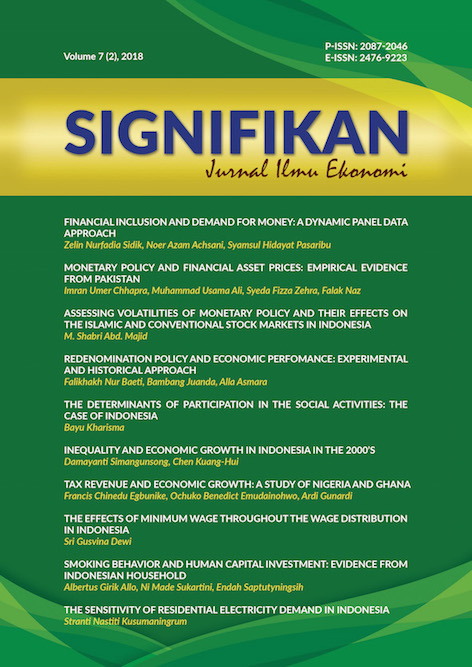The Determinant of Participation in The Social Activities: Case in Indonesia
DOI:
https://doi.org/10.15408/sjie.v7i2.7365Keywords:
social capital, unconditional cash transfer, differences-in-differences analysisAbstract
One of the most issues debated in the social capital literature is the unconditional cash transfer effect on social capital, especially regarding the potential of unmeasured targeted mechanisms at the community level about social relations. This article aims to identify the determinant of social capital in the form of household participation in social activities and the impact of unconditional cash transfers (BLT) on participation in social activities in Indonesia by using differences-differences approach (DID). The results showed that the most influential factor on household participation in social activities is the education level of the head of the household and the members of the productive age group. Meanwhile, unconditional cash transfers policy has a positive effect on the rotating saving and credit association. Thus, participation in social activities undertaken by the community undoubtedly has an important element in the success of government programs.
References
Aghion, P., Algan, Y., Cahuc, P., & Shleifer, A. (2010). Regulation and Distrust. Quarterly Journal of Economics. Vol. 125(3): 1015‐1049. doi: https://doi.org/ 10.3386/w14648.
Anderson, S., & Baland, J. (2002). The Economics Of Roscas And Intrahousehold Resource Allocation. Quarterly Journal of Economics. Vol. 117: 963-995. doi: https://doi.org/10.1162/003355302760193931.
Attanasio, O., Pellerano, L., & Polania, S., (2008). Building Trust: Conditional Cash Transfer and Social Capital. Working Paper EWP08/02. Centre for the Evaluation of Development Policies. The Institute For Fiscal Studies.
Babajanian, V. B (2008). Social Capital and Community Participation in Post-Soviet Armenia: Implications for Policy and Practice. Europe Asia Studies. 60(8): 1299-1319.
Babajanian, V.B (2012) Social Protection and Its Contribution to Social Cohesion and State Building. Munich: Eschborn GIZ, Deutsche Gesellschaft für Internationale Zusammenarbeit (GIZ) GmbH.E schborn GIZ.
Bank of Indonesia. (2005). Laporan Perekonomian Indonesia 2005 (The Indonesian Economic Report 2005. Jakarta: Bank of Indonesia.
Bertrand, M., Duflo, E., & Mullainathan, S. (2004) How Much Should We Trust Differences-in-Differences Estimates?. Quarterly Journal of Economics. Vol. 119 (1): 249–275. doi: https://doi.org/10.3386/w8841.
Cahyono, S. A. (2010). Dampak Bantuan Langsung Tunai dan Investasi Sumber Daya Manusia Terhadap Ekonomi Rumah Tangga Sekitar Hutan Pinus di Desa Samagede (Influence of Direct Cash Assistance and Investment in Human Resources on Household Economy Around Forest). Jurnal Penelitian Sosial dan Ekonomi Kehutanan. Vol. 7 (2): 101-115.
Cameron, L & Olivia, S. (2010). Scaling Up Rural Sanitation: Findings from the Impact Evaluation Baseline Survey in Indonesia. Technical report Water and Sanitation Program: Technical Paper. Washington, DC: World Bank.
Cameron, L., & Shah, M. (2012). Mistargetting of Cash Transfer, Social Capital Destruction and Crime in Indonesia. Working Paper. Victoria. Monash University
Coleman, J. (1990). Foundations of Social Theory. Cambridge Mass: Harvard University Press.
Fukuyama, F. (1995). The End of History and The Last Man. New York: Free Press.
Fukuyama, F. (2000) Social Capital in H. Lawrence E., and S. P. Huntington, Cultural Matters: How Values Shape Human Progress. New York: Basic Books.
Gertler, P., Levine, D. I., & Moretti, E. (2006). Is Social Capital the Capital of the Poor? The Role of Family and Community in Helping Insure Living Standards Against Health Shocks. CESifo Economic Studies. Vol. 52 (3): 455-499. doi: https://doi.org/10.1093/cesifo/ifl012.
Glaeser, E. (2001). The Formation of Social Capital. In: Heliwell, J. F. (Eds). The Contribution of Human and Social Capital to Sustained Economic Growth and Well-Being. Canada: OECD and Human Resources Development.
Grootaert, C. (1999) Social Capital, Household Welfare and Poverty in Indonesia. Washingthon: World Bank.
Hooghe, M & Oser, J (2015). Internet, Television and Social Capital: The Effect Of ‘Screen Time’ on Social Capital. Journal Information, Communication & Society. Vol. 18 (10): 1175-1199. doi: https://doi.org/10.1080/1369118X.2015.1022568.
Hossain, N. (2010) School Exclusion As Social Exclusion: The Practices And Effects Of A Conditional Cash Transfer Programme For The Poor In Bangladesh. Journal of Development Studies. Vol. 46: 1264–1282. doi: https://doi.org/ 10.1080/00220388.2010.487096.
Jordan, J. L., Anil, B., & Munasib., A (2010). Community Development and Local
Social Capital. Journal of Agricultural and Applied Economics. Vol. 42 (1): 143-159. doi: https://doi.org/10.1017/S1074070800003357.
Keefer, P., & Knack, S., (2005). Social Capital, Social Norms And The New Institutional Economics. In: Ménard, C., & Shirley, M. M. (Eds.). Handbook of New Institutional Economics. New York: Springer.
Putnam, R., D. (1995) Bowling Alone: America’s Declining Social Capital. .Journal of Democracy. Vol. 6 (1): 65-78. doi: https://doi.org/10.1353/jod.1995.0002.
Ressler, P. (2008). The Social Impact of Cash Transfer A Study of The Impact of Cash Transfer on Social Networks of Kenyan Households Participating in Cash Transfer Programs. Working Paper. Washington DC: International Food Policy Research Institute.
Van Ingen, E & Van Eijck (2009) Leisure and Social Capital: An Analysis of Types of Company and Activities. Leisrure Sciences: An Interdisciplinary Journal. Vol. 31 (2): 192-206. doi: https://doi.org/10.1080/01490400802686078.
Varadharajan, S. (2004). Explaining Participation in Rotating Savings and Credit Associations (RoSCAs): Evidence from Indonesia. Working Paper. New York: Cornell University.
Wolz, A., Fritzsch, J., & Reinsberg, K. (2005). The Impact of Social Capital on Farm and Household Income: Results of A Survey Among Individual Farmers in Poland. Proceeding Paper. The 94th EAAE Seminar ‘From Households To Firms with Independent Legal Status: The Spectrum Of Institutional Units in The Development of European Agriculture’, Ashford (UK), 9-10 April 2005.


